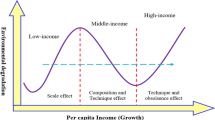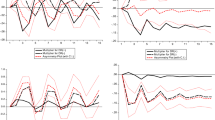Abstract
As one of the world’s largest economies, Chinese economy is maintaining the rapid economic development along with the cost of environmental degradation. The role of fiscal policy instruments is still unknown in the Chinese pollution equation. To do this, the present study is an effort to quantify the nexus of fiscal policy instruments and environmental degradation for Chinese economy over 1980 to 2016. The results reveal that fiscal policy instruments significantly increase the environmental degradation in the long run. The GDP and energy consumption of Chinese economy also enhance the environmental degradation respectively. The innovative accounting approach and diagnostics tests also applied to confirm the empirical estimates of study are reliable and valid for policy implications. The outcomes of study reveal that expansionary fiscal policy will lead to environmental degradation. Therefore, the Chinese authorities may consider the usage of advance and eco-friendly production methods to sustain the fast-growing economic growth along with the healthier environment.







Similar content being viewed by others
References
Abdouli M, Hammami S (2017) Investigating the causality links between environmental quality, foreign direct investment and economic growth in MENA countries. Int Bus Rev 26:264–278
Abdouli M, Kamoun O, Hamdi B (2018) The impact of economic growth, population density, and FDI inflows on CO 2 emissions in BRICTS countries: Does the Kuznets curve exist? Empir Econ 54(4):1717–1742
Ahmed Z, Wang Z, Mahmood F et al (2019a) Environ Sci Pollut Res. https://doi.org/10.1007/s11356-019-05224-9
Ahmed Z, Wang Z, Mahmood F, Hafeez M, Ali N (2019b) Does globalization increase the ecological footprint? Empirical evidence from Malaysia. Environ Sci Pollut Res:1–18
Alam A (2013) Nuclear energy, CO2 emissions and economic growth the case of developing and developed countries. J Econ Stud 40(6):822–834
Alam A, Azam M, Bin Abdullah A, Malik IA, Khan A, Hamzah TAAT et al (2014) Environmental quality indicators and financial development in Malaysia: unity in diversity. Environ Sci Pollut Res 22:8392–8404
Al-Mulali U, Saboori B, Ozturk I (2015) Investigating the environmental Kuznets curve hypothesis in Vietnam. Energy Policy 76:123–131. https://doi.org/10.1016/j.enpol.2014.11.019
Aung TS, Saboori B, Rasoulinezhad E (2017) Economic growth and environmental pollution in Myanmar: an analysis of environmental Kuznets curve. Environ Sci Pollut Res 24(25):20487–20501
Balcilar M, Ciftcioglu S, Gungor H (2016) The effects of financial development on Investment in Turkey. Singap Econ Rev 61(4):1650002. https://doi.org/10.1142/S0217590816500028
Bento JPC, Moutinho V (2016) CO2 emissions, non-renewable and renewable electricity production, economic growth, and international trade in Italy. Renew Sust Energ Rev 55:142–155
Cetin M, Ecevit E (2017) The impact of financial development on carbon emissions under the structural breaks: empirical evidence from Turkish economy. Int J Econ Perspect 11(1):64–78
Charfeddine L, Al-malk AY, Al K (2018) Is it possible to improve environmental quality without reducing economic growth: evidence from the Qatar economy. Renew Sust Energ Rev 82:25–39. https://doi.org/10.1016/j.rser.2017.09.001
das Neves Almeida TA, García-Sánchez IM (2017) Sociopolitical and economic elements to explain the environmental performance of countries. Environ Sci Pollut Res 24(3):3006–3026
Dongyan L (2009) Fiscal and tax policy support for energy efficiency retrofit for existing residential buildings in China’s northern heating region. Energy Policy 37(6):2113–2118. https://doi.org/10.1016/j.enpol.2008.11.036
Engle RF, Granger CW (1987) Co-integration and error correction: representation, estimation, and testing. Econometrica 251–276
Galinato GI, Islam F (2014) The challenge of addressing consumption pollutants with fiscal policy Working Paper Series WP. Washington State University
Goulder LH (2013) Climate change policy’s interactions with the tax system. Energy Econ 40:S3–S11
Hafeez M, Chunhui Y, Strohmaier D, Ahmed M, Jie L (2018) Does finance affect environmental degradation: evidence from One Belt and One Road Initiative region? Environ Sci Pollut Res:1–14
Hafeez M, Yuan C, Khelfaoui I, A Sultan Musaad O, Waqas Akbar M, Jie L (2019a) Evaluating the energy consumption inequalities in the One Belt and One Road Region: Implications for the Environment. Energies 12(7):1358
Hafeez M, Yuan C, Shahzad K, Aziz B, Iqbal K, Raza S (2019b) An empirical evaluation of financial development-carbon footprint nexus in One Belt and Road region. Environ Sci Pollut Res:1–11
Hafeez M, Yuan C, Yuan Q, Zhuo Z, Stromaier D (2019c) A global prospective of environmental degradations: economy and finance. Environ Sci Pollut Res:1–18
Halkos GE, Paizanos EΑ (2013) The effect of government expenditure on the environment: An empirical investigation. Ecol Econ 91:48–56
Halkos GE, Paizanos EA (2016) The effects of fiscal policy on CO2 emissions: evidence from the U.S.A. Energy Policy 88:317–328
Iqbal K, Peng H, Hafeez M, Ahmad K, Tang L (2019) Corruption, income inequality and decline in South Asia. Hum Syst Manag 38(3):235–241
Islam F, Lopez R (2015) Government spending and air pollution in the U.S. Int. Rev. Env. Resour. Econ. 8(2):139–189
Istaiteyeh RMS (2016) Causality analysis between electricity consumption and real GDP: evidence from Jordan. Int J Econ Perspect 10(4):526–540
Iwata H, Okada K, Samreth S (2012) Empirical study on the determinants of CO2 emissions: evidence from OECD countries. Appl Econ 44:3513–3519
Jalil A, Feridun M (2011) The impact of growth, energy and financial development on the environment in China: a cointegration analysis. Energy Econ 33(2):284–291. https://doi.org/10.1016/j.eneco.2010.10.003
Jamel L, Derbali A (2016) Do energy consumption and economic growth lead to environmental degradation? Evidence from Asian economies. Cogent Economics & Finance 4(1):1170653
Jamel L, Maktouf S (2017) The nexus between economic growth, financial development, trade openness, and CO2 emissions in European countries. Cogent Economics & Finance 5(1):1341456
Johansen S (1988) Statistical analysis of cointegration vectors. J Econ Dyn Control 12(2-3):231–254
Kalayci S, Koksal C (2015) The relationship between China’s airway freight in terms of carbon-dioxide emission and export volume. Int J Econ Perspect 9(4):60–68
Kasman A, Duman YS (2015) CO2 emissions, economic growth, energy consumption, trade and urbanization in new EU member and candidate countries: a panel data analysis. Econ Model 44:97–103
Katircioglu S, Katircioglu S (2018) Testing the role of fiscal policy in the environmental degradation: the case of Turkey. Environ Sci Pollut Res 25(6):5616–5630
Kaushal LA, Pathak N (2015) The causal relationship among economic growth, financial development and trade openess in Indian economy. Int J Econ Perspect 9(2):5–22
Lean HH, Smyth R (2010) CO2 emissions, electricity consumption and output in ASEAN. Appl Energy 87(6):1858–1864
Liu Y, Han L, Yin Z, Luo K (2017) A competitive carbon emissions scheme with hybrid fiscal incentives: the evidence from a taxi industry. Energy Policy 102:414–422. https://doi.org/10.1016/j.enpol.2016.12.038
Liu J, Yuan C, Hafeez M, Yuan Q (2018) The relationship between environment and logistics performance: evidence from Asian countries. J Clean Prod 204:282–291
Liu Y, Li Z, Yin X (2018) The effects of three types of environmental regulation on energy consumption—evidence from China. Environ Sci Pollut Res 25(27):27334–27351
Lopez R, Palacios A (2014) Why has Europe become environmentally cleaner? Decomposing the roles of fiscal, trade and environmental policies. Environ Resour Econ 58(1):91–108
Lopez R, Galinato GI, Islam F (2011) Fiscal spending and the environment: theory and empirics. J Environ Econ Manag 62:180–198
McAusland C (2008) Trade, politics, and the environment: Tailpipe vs. smokestack. J Environ Econ Manag 55(1):52–71
Narayan PK (2005) The saving and investment nexus for China: evidence from cointegration tests. Appl Econ 37(17):1979–1990
Ozcan B, Ari A (2017) Nuclear energy-economic growth nexus in OECD countries: a panel data analysis. Int J Econ Perspect 11(1):138–154
Pesaran MH, Shin Y, Smith RJ (2001) Bounds testing approaches to the analysis of level relationships. J Appl Econ 16(3):289–326
Rauf A, Liu X, Amin W, Ozturk I, Rehman OU, Hafeez M (2018) Testing EKC hypothesis with energy and sustainable development challenges: a fresh evidence from Belt and Road Initiative economies. Environ Sci Pollut Res 25:1–15
Rausch S (2013) Fiscal consolidation and climate policy: an overlapping generation’s perspective. Energy Econ 40:S134–S148. https://doi.org/10.1016/j.eneco.2013.09.009
Salam S, Hafeez M, Mahmood MT, Akbar K (2019) The dynamic relation between technology adoption, technology innovation, human capital and economy: comparison of lower-middle-income countries. Interdiscip Descr Complex Syst: INDECS 17(1-B):146–161
Sekrafi H, Sghaier A (2018) Examining the relationship between corruption, economic growth, environmental degradation, and energy consumption: a panel analysis in MENA region. J Knowl Econ 9(3):963–979
Uddin GA, Salahuddin M, Alam K, Gow J (2017) Ecological footprint and real income: panel data evidence from the 27 highest emitting countries. Ecol Indic 77:166–175. https://doi.org/10.1016/j.ecolind.2017.01.003
World Bank (2017) World development indicators. Retrieved from: http://www.worldbank.org. Accessed March, 2019
Yan X, Crookes RJ (2010) Energy demand and emissions from road transportation vehicles in China. Prog Energy Combust Sci 36(6):651–676
Yao X, Yasmeen R, Li Y, Hafeez M, Padda IUH (2019) Free trade agreements and environment for sustainable development: a gravity model analysis. Sustainability 11(3):597. https://doi.org/10.3390/su11030597
Yasmeen R, Li Y, Hafeez M, Ahmad H (2018) The trade-environment nexus in light of governance: a global potential. Environ Sci Pollut Res 25:34360–34379
Yasmeen R, Li Y, Hafeez M (2019) Tracing the trade–pollution nexus in global value chains: evidence from air pollution indicators. Environ Sci Pollut Res 26:5221–5233
Zambrano‐Monserrate MA, Fernandez MA (2017) An environmental Kuznets curve for N2O emissions in Germany: an ARDL approach. In: Natural Resources Forum, vol 41, No. 2 Blackwell Publishing Ltd, Oxford, pp 119–127
Zhang C, Lin Y (2012) Panel estimation for urbanization, energy consumption and CO2 emissions: a regional analysis in China. Energy Policy 49:488–498. https://doi.org/10.1016/j.enpol.2012.06.048
Zhang M, Mu H, Ning Y, Song Y (2009) Decomposition of energy-related CO2 emission over 1991–2006 in China. Ecol Econ 68(7):2122–2128
Zhao W, Cao Y, Miao B, Wang K, Wei YM (2018) Impacts of shifting China’s final energy consumption to electricity on CO2 emission reduction. Energy Econ 71:359–369
Author information
Authors and Affiliations
Corresponding author
Additional information
Responsible editor: Nicholas Apergis
Publisher’s note
Springer Nature remains neutral with regard to jurisdictional claims in published maps and institutional affiliations.
Rights and permissions
About this article
Cite this article
Yuelan, P., Akbar, M.W., Hafeez, M. et al. The nexus of fiscal policy instruments and environmental degradation in China. Environ Sci Pollut Res 26, 28919–28932 (2019). https://doi.org/10.1007/s11356-019-06071-4
Received:
Accepted:
Published:
Issue Date:
DOI: https://doi.org/10.1007/s11356-019-06071-4




